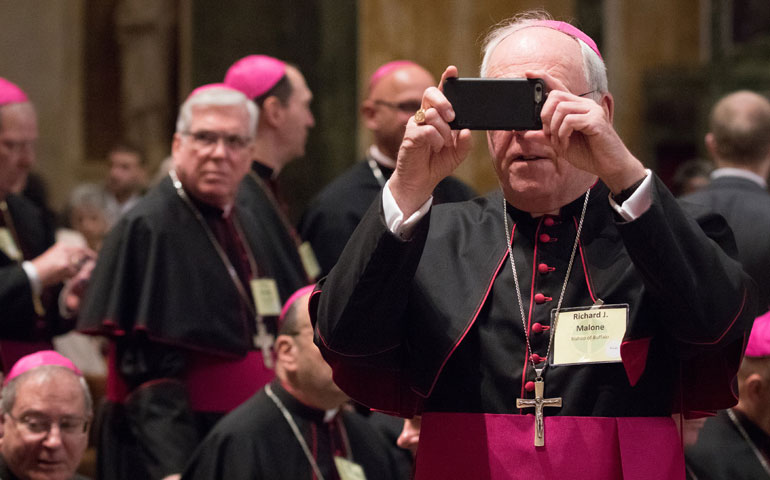
Bishop Richard Malone of Buffalo, N.Y., snaps a photograph before a prayer and meeting with Pope Francis at the Cathedral of St. Matthew the Apostle in Washington Sept. 23. (CNS/St. Louis Review/Lisa Johnston)
One of the major decisions facing the nation's bishops when they meet Nov. 16-19 for their annual fall assembly in Baltimore will be what "strategic priorities" to focus on through the year 2020, a discussion that drew some pointed debate during the group's spring gathering.
The bishops will also vote on a new introductory note and "limited" revision to "Forming Consciences for Faithful Citizenship," a quadrennial statement issued the year before each presidential election.
According to a release from the U.S. Conference of Catholic Bishops, the revised citizenship statement "will feature new language around issues of public concern for Catholics" arrived at by a working group led by Galveston-Houston Cardinal Daniel DiNardo, conference vice president.
The priorities proposed in St. Louis in June (NCR, July 3-16) focused on family and marriage; evangelization; religious freedom; human life and dignity; and vocations. Discussion arose around the questions of whether the conference was simply doing more of the same and whether the agenda, which will be used for a 2017-20 strategic plan, should better reflect the issues Pope Francis has emphasized.
Seattle Archbishop Peter Sartain, chair of the Committee on Priorities and Plans, emphasized at the time that the proposal was merely a draft open to change and that a final vote would occur at the November meeting.
Several bishops expressed dissatisfaction and disappointment with the draft, arguing that it did not place enough emphasis on poverty or the environment and that it did not make a strong statement on advocating on behalf of immigrants and for reform of immigration laws.
Bishop George Thomas of Helena, Mont., was blunt: "I want to express my disappointment. I really do believe that there needs to be much greater visibility given to the plight of the poor, the economic disparity that so many families feel, rural poverty, joblessness, the struggle of the working poor."
He added that he hoped "the body of bishops would throw our collective weight behind a voice of advocacy for the poor in America."
Since the U.S. bishops' last gathering, the themes of the Francis papacy have come more into focus. Days after the June meeting, the Vatican released "Laudato Si', on Care for Our Common Home," Francis' encyclical on the environment and human ecology, and in October, bishops worldwide concluded the two-year Synod of Bishops on the family.
In the middle, Francis made his first-ever visit to the U.S., bringing a message of mercy to all, and appealing for the pursuit of the common good and embrace of the immigrant.
On the latter point, he spoke candidly to U.S. bishops Sept. 23 at the Cathedral of St. Matthew the Apostle in Washington, D.C., thanking them for their efforts to date but encouraging them to go further.
"Perhaps it will not be easy for you to look into their soul; perhaps you will be challenged by their diversity. But know that they also possess resources meant to be shared. So do not be afraid to welcome them. ... I am certain that, as so often in the past, these people will enrich America and its church," Francis said.
In that same prayer service, the pope stressed the need to substitute "harsh and divisive language" for unconstrained "authentic dialogue" with all facets of society, adding he "cannot ever tire of encouraging you to dialogue fearlessly."
Following the service, Pittsburgh Bishop David Zubik expressed appreciation for the pope's instructions. "You don't get very far building walls," Zubik said. "It never happens that way. People first have to be able to listen to each other. You don't accomplish anything with a stalemate."
During their meeting this month, the U.S. bishops also will vote for treasurer-elect of the conference and chairman-elect of six conference committees:
- Catholic Education (nominees: Archbishop Robert Carlson of St. Louis, Bishop George Murry of Youngstown, Ohio);
- Clergy, Consecrated Life and Vocations (nominees: Archbishop Samuel Aquila of Denver, Archbishop Joseph Tobin of Indianapolis);
- Divine Worship (nominees: Bishop John Barres of Allentown, Pa., Archbishop Wilton Gregory of Atlanta);
- Domestic Justice and Human Development (nominees: Bishop Frank Dewane of Venice, Fla., Bishop Robert McElroy of San Diego);
- Laity, Marriage, Family Life and Youth (nominees: Bishop Frank Caggiano of Bridgeport, Conn., Archbishop Charles Chaput of Philadelphia);
- Migration (nominees: Archbishop José Gomez of Los Angeles, Archbishop John Wester of Santa Fe, N.M.)
The bishops will also elect the conference's next general secretary and bishop members of the boards of Catholic Relief Services and the Catholic Legal Immigration Network Inc.
Discussion and votes will also be held on the statement "Create in Me a Clean Heart: A Pastoral Response to Pornography," as well as on the inclusion of Excerpts from the Roman Missal: Book for Use at the Chair in dioceses of the United States. The bishops will also discuss and vote on a proposed one-time national collection to fund completion of the Trinity Dome in the Basilica of the National Shrine of the Immaculate Conception in Washington.
[Tom Roberts is NCR editor-at-large. His email address is troberts@ncronline.org.]
